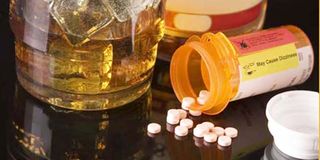Prime
The ills of self medication

What you need to know:
Pharmarcists, doctors and other healthcare professionals are faced with increasing numbers of people self-medicating. They are often approached by clients (patients) specifically asking for antibiotics without any prescription. But what could be the dangers of self medicating?
Pharmarcists, doctors and other healthcare professionals are faced with increasing numbers of people self-medicating. They are often approached by clients (patients) specifically asking for antibiotics without any prescription. But what could be the dangers of self medicating? Pharmacist James William Tamale explains all.
Several individuals do not consult a doctor when they fall sick. They will either run to their nearest pharmacy/pharmacist to get medicine or may consult a neighbour for tablets left over from their previous illness, who readily shares them. When you have a cold, cough, fever, constipation, indigestion, or headache, your friends or even total strangers will volunteer advice on the medicines you should take. Almost everyone you meet will have a presumably excellent remedy for whatever sickness you may have. Simply, this is what is meant by self-medication.
Self-medication: What you need to know
Self-medication is a very common practice in our day-to-day setting. Pharmacists, doctors and other health care professionals are faced with increasing numbers of people self-medicating or willing to self medicate. It is common for them to be approached by clients (patients) specifically asking for antibiotics or other prescription medicines in a pharmacy setting without any prescription.
Broadly speaking, self-medication is the use of drugs (medicines) or self-soothing forms of behaviour to treat a perceived or real illness. It is often referred to in the context of a person self-medicating, in order to relieve their own distress or pain without professional supervision or advice.
Self-medication is the treatment of common health problems with medicines especially designed and labelled for use without medical supervision and approved as safe and effective for such use. Most people believe that there is a pill for every illness. This has not been helped by the recent advances in drug research that have contributed to the over 7,000 drugs and drug combinations available the world over. Many of these have been released for general use, and are sold directly to the public as over the counter (OTC) remedies.
The public (consumers) needs to know that there’s an obvious difference between drugs and other commodities of life. The consumer has no way of judging the efficacy of a drug or its dangers, and therefore these judgments have to be made for them by qualified health professionals. Before I delve into the dangers associated with self-medication, let’s understand the main terminologies used in classifying medicines (drugs). Medicines for self-medication are often called ‘nonprescription’ or over the counter and are available without a doctor’s prescription through pharmacies.
These include pain relievers, cough remedies, anti-allergies, laxatives, vitamins, tonics, antacids and many others. In some countries, OTC products are also available in supermarkets and other outlets. Medicines that are available from doctors with a prescription are called prescription products.
The term “responsible self-medication” is often used to emphasise the appropriate use of OTC medicines by informed patients and consumers, with healthcare professional support where necessary.
By contrast, the term “self-prescription” is used for the inappropriate practice of using prescription products without medical supervision. Self-prescription is an unfortunate feature of a number of developing countries, Uganda inclusive where good healthcare systems and regulatory mechanisms are absent or weak.
Benefits of responsible self-medication
In a world of scarce government and in many countries with scarce individual resources, responsible self-medication should be a cornerstone of healthcare provision and health policy. Responsible self-medication can:
• Help to prevent and treat symptoms and ailments that do not require a doctor.
• Reduce the pressure on medical services where health care personnel are insufficient.
• Increase the availability of health care to populations living in rural or remote areas.
• Enable patients to control their own chronic conditions.
These benefits translate into patient and consumer wellness and productivity, economic gain for employers, and cost savings to healthcare budgets through reduced medicine budget cost and reduced physician visits.
Roles of individuals in self-medication
The International Pharmaceutical Federation (FIP) and the World Medical Association (WMA) have published guidance relating to the roles and responsibilities of individuals. The individual bears the sole responsibility for use of self-medication products. Special caution should be exercised when vulnerable groups like children, the elderly or pregnant women self-medicate.
When individuals decide to self-medicate, they should be able to recognise the symptoms they are treating, should determine that their condition is suitable for self-medication, should choose an appropriate self-medication product, and must follow the directions for use of the product as stated on the product labelling.
In order to minimise the potential risks involved in self-medication, it’s important that health professionals educate patients regarding the appropriate use of non-prescription medicines, and should advise patients to seek further advice from a pharmacist or doctor if they are unsure. The pharmacist has a professional responsibility to recommend, in appropriate circumstances, that medical advice be sought. Most important is that clients (and or patients) should always remember that medicines (drugs) are special products and that they should always heed the pharmacist’s or doctor’s advice to avoid any risk or potential of misuse and abuse.
The risk of self-medication
Self-medication can be dangerous. Interpretation of both signs and symptoms of the illness and side-effects are responsibilities for the professionals. For all cases, the prescription and management of medication must be done by responsible health care professionals (e.g. doctors, pharmacists) working closely with the patient. This is the only way to ensure that the most effective use of medication is achieved with minimum risk of side-effects or complications. The general public should observe that all drugs are poisons. The ever expanding availability of medical care, exposes a large population of people to drugs.
This situation is further worsened in our country by the weak regulatory mechanisms, where even certain prescription drugs are available to the lay person without a doctor’s advice. Consumers should note that people vary greatly in their sensitivity (or reaction) to drugs; an appropriate dose for one person may not be appropriate for another. Thus, the lay person is ill-advised in subjecting himself to potentially dangerous self-medication.
The most misused drugs are the analgesics or pain relievers. Similarly cough remedies, anti- allergies, laxatives, vitamins, tonics, and antacids can lead to serious side effects. The primal duties of pharmacists and doctors is to educate the masses when not to take medicines, and to seek professional advice.
Government’s role in self-medication
Governments should recognise and enforce the distinction between prescription and non-prescription medicines, and ensure that the users of self-medication are well informed and protected from possible harm or negative long-term effects.
Promotion and marketing of self-medication products
Advertising and marketing of non-prescription medicines by various companies should be responsible, provide clear and accurate information and exhibit a fair balance between benefit and risk information. Promotion and marketing should not encourage irresponsible self-medication, purchase of medicines that are inappropriate, or purchases of larger quantities of medicines than are necessary. People must be encouraged to treat medicines (prescription and non-prescription) as special products and that standard precautions should be followed in terms of safe storage and usage, in accordance with professional advice.
Pharmacists’ responsibility
• Pharmacists have a professional obligation to provide sound, objective advice about self-medication and the medicinal products available for self-medication
• Pharmacists should recommend that medical advice should be sought where it is recognised that self-medication is not appropriate
• Pharmacists should report to the regulatory authorities of any adverse event encountered by an individual which may be associated with use of a medicine purchased without a prescription
• Pharmacists should encourage members of the public to treat medicines as special products to be stored and used with care and, not to take any action which could encourage people to buy excessive quantities of a medicine
What needs to be done?
The public interest will best be served when, first, the lay person is more educated about the dangers of indiscriminate use of drugs. Consumer protection groups also have an important role to play in educating consumers about the proper steps that must be followed in accessing and using medicines. Secondly, health professionals should be more judicious in following the recommended guidelines and regulations for prescribing and dispensing of prescription drugs. Thirdly, regulatory bodies (NDA and professional Health Councils) should ensure that professionals exhibit professionalism and conform to ethical principles of practice during the discharge of their duties, and that proper statutory drug regulatory measures are implemented. These three measures will definitely reduce the incidence of irresponsible self-medication and drug related mishaps, and help in maintaining good health of individuals and the society.
The writer is a Pharmacist and, President Pharmaceutical Society of Uganda




